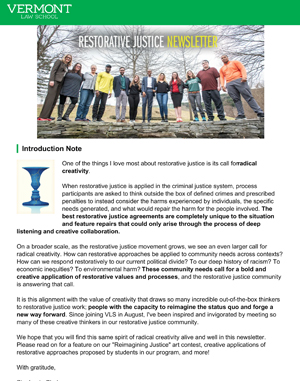––The Vermont Supreme Court will hear oral arguments in five cases during the high court’s annual session at Vermont Law School on Wednesday, March 14, in Oakes Hall, Room 109, on the VLS campus. The session is open to the public and will be streamed live at vermontlaw.edu/live. Vermont Court Rules apply for media coverage.
The court will consider the following cases:
State of Vermont v. Stuart Lizotte Jr.; 2017-127 (9:30 a.m.)
Can the State prosecute for possession of child pornography based on a tip from the National Center for Missing and Exploited Children that an email attachment contains pornography?
Summary: Defendant Stuart Lizotte conditionally pled guilty to one count of possessing child pornography, two counts of promoting child pornography, and two counts of aggravated sexual assault after police looked at a file he had attached to an email. In his conditional plea, defendant retained his right to appeal the trial court’s decision denying his motion to suppress all evidence seized as a result of a search warrant issued based on a cybertip provided to Vermont police by the National Center for Missing and Exploited Children (NCMEC) via their cyber tipline. Defendant argues that the trial court improperly denied his motion to suppress because the search warrant that Vermont police used to gain access to his email was an unlawful search and seizure under the Fourth Amendment of the U.S. Constitution and Chapter I, Article 11, of the Vermont Constitution. Defendant argues that he had a reasonable expectation of privacy in his emails, that NCMEC acted as an agent of law enforcement when it opened and viewed the video file, and that he did not consent to this search.
State of Vermont v. Lucas Dwight; 2017-075 (10 a.m.)
Do medical expenses paid for by a third-party warrant reimbursement under Vermont’s restitution statute?
Summary: This case examines the extent to which Vermont’s restitution statute covers the payment of medical expenses by a third party on behalf of a crime victim. The victim in this case, a University of Vermont student, was at a bar in downtown Burlington one evening when he got into an argument with defendant Lucas Dwight. After the victim left the bar, defendant approached and “impacted” the victim’s face, causing severe damage to four of his teeth. Defendant was charged with simple assault, to which he pled nolo contendere. However, the parties disagreed as to the amount of restitution for the victim’s dental expenses. During a hearing on the matter, the victim’s father testified that he paid $21,000 in dental expenses to fix the victim’s teeth. Defendant argued that, while it was certainly laudable that a parent would want to cover his or her child’s medical expenses, the father was not a “victim” as defined in the restitution statute, which includes only those who sustain injury as the “direct result” of a crime or the family member of a minor, a person who has been found incompetent, or a homicide victim. The trial court disagreed and held that the victim’s uninsured medical bills—whether paid by his father or not—were a “direct result” of the crime and ordered restitution. Defendant’s argument on appeal mirrors his argument below: the restitution statute does not pertain to the victim’s father’s expenses because he is neither a direct victim nor the family member of a minor victim.
In re Kenneth Barber Jr. and consolidated cases; 2015-451 etc. (11 a.m.)
Should a guilty plea be overruled due to a new Vermont Supreme Court decision that states that plea deals should not be accepted without determining accuracy?
Summary: In Vermont state courts, the majority of criminal cases result in plea deals. Vermont Rule of Criminal Procedure 11(f) says that a court should not accept a plea deal without engaging in an inquiry sufficient to find that there is a factual basis for the plea—in other words, the plea must be accurate. In these four consolidated cases, each defendant was convicted of a crime after pleading guilty and is now serving the sentence set out in the defendant’s plea deal. The defendants argue that their convictions should be vacated because no factual basis was established for their plea according to Rule 11(f). Defendants’ arguments are heavily influenced by the Vermont Supreme Court’s recent decision, In re Anthony Bridger, 2017 VT 79, in which the Court determined that a plea agreement from 2009 did not comport with Rule 11(f). In doing so, the court found: (1) “substantial compliance” with Rule 11(f) was insufficient to demonstrate a defendant’s admission to all facts relevant to the charge, overturning some past caselaw; and (2) a defendant's generic admission to unspecified facts in multiple affidavits covering numerous charges did not provide an adequate factual basis sufficient to support his guilty plea. The issue here is whether Bridger should be considered a “new” rule and applied retroactively to evaluate the trial court’s compliance with Rule 11(f) in each of the consolidated cases.
David Tanzer v. MyWebGrocer, Inc.; 2017-193 (1:30 p.m.)
How should MyWebGrocer’s “phantom stock”—hypothetical equity given to employees that became actual equity when the company converted from one business type to another—be valued? Was MyWebGrocer’s payout of phantom stock to a former employee a breach of contract or a violation of the covenant of good faith and fair dealing?
Summary: David Tanzer sued his former employer, MyWebGrocer, for breach of contract, breach of the covenant of good faith and fair dealing, unjust enrichment, and violation of Vermont’s wage statute. These allegations were based on Tanzer’s underlying claim that the company undervalued employee payouts from “phantom stock”—an unvalued percentage of company equity that was given to employees and later converted into valued equity when the company converted from one business type to another. The trial court dismissed some of Tanzer’s claims on summary judgment, and a jury trial proceeded on the remaining claims. The jury eventually awarded Tanzer a large judgment, which included an award for breach of contract as well as compensatory and punitive damages. MyWebGrocer appeals, primarily disputing the correct interpretation of the company plan governing phantom stock and whether the parties’ business and litigation conduct was improper.
Estate of Dezirae Sheldon v. Nicholas Ruggiero; 2017-387 (2 p.m.)
Can the estate of a child murdered by her stepfather sue an independent contractor for the Department for Children and Families for negligence because the contractor did not warn the Department of possible previous abuse by the stepfather?
Summary: This is a negligence case concerning allegations of child abuse. In February 2013, Dezirae Sheldon’s mother brought her to the hospital with blunt-trauma fractures to her legs. In response, the Department for Children and Families (DCF) began an investigation concerning the child’s injuries. Eventually DCF found that the child’s mother had caused the injuries and substantiated the mother for physical abuse and medical neglect. The mother appealed DCF’s decision through the agency’s internal appeals process. In this appeal, Nicholas Ruggiero, an independent contractor with DCF interviewed the mother, who offered several inconsistent explanations for the child’s injuries, including that her then-boyfriend had caused the injuries. Ruggiero denied the mother’s appeal, effectively affirming DCF’s conclusion that that the mother had caused the injuries. In February 2014, DCF returned Dezirae to her mother’s custody and the mother’s boyfriend, now mother’s husband. Several months later, Dezirae was killed. Her stepfather pled guilty to her murder. Dezirae’s biological father sued Ruggiero for negligence in failing to report allegations of abuse, derived from Dezirae’s mother’s statement that her boyfriend caused the injuries to Dezirae’s legs, under the mandatory reporting statute and in negligently undertaking his own abuse investigation instead of making a report. The trial court granted summary judgment to the contractor, and the father appeals.
###
Vermont Law School, a private, independent institution, is home to the nation’s largest and deepest environmental law program. VLS offers a juris doctor curriculum that emphasizes public service; four master’s degrees—Master of Environmental Law and Policy, Master of Energy Regulation and Law, Master of Food and Agriculture Law and Policy, and Master of Arts in Restorative Justice; and four post-JD degrees—LLM in American Legal Studies (for foreign-trained lawyers), LLM in Energy Law, LLM in Environmental Law, and LLM in Food and Agriculture Law. The school features innovative experiential programs and is home to the Environmental Law Center, South Royalton Legal Clinic, Environmental and Natural Resources Law Clinic, Energy Clinic, Food and Agriculture Clinic, Center for Applied Human Rights, and Center for Justice Reform. For more information, visit vermontlaw.edu, find us on Facebook, and follow us on Twitter and Instagram.


















